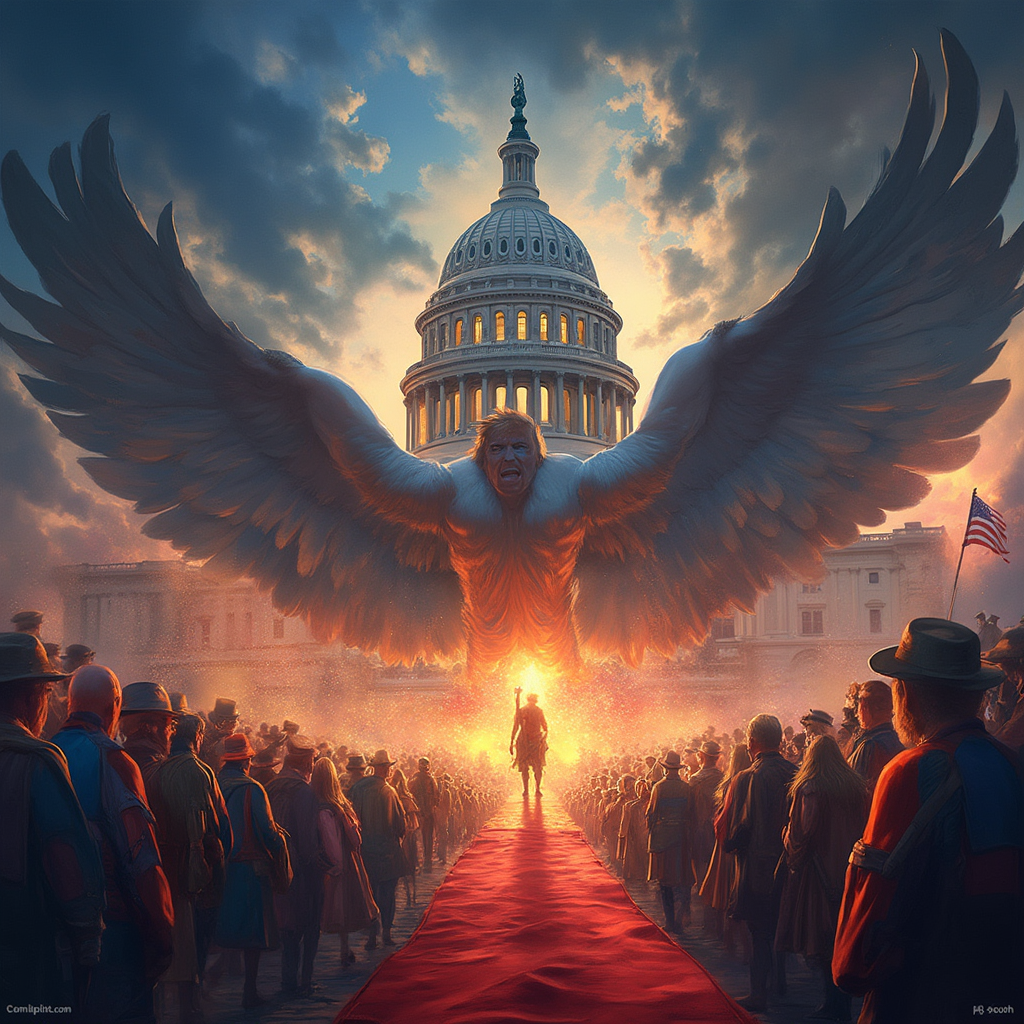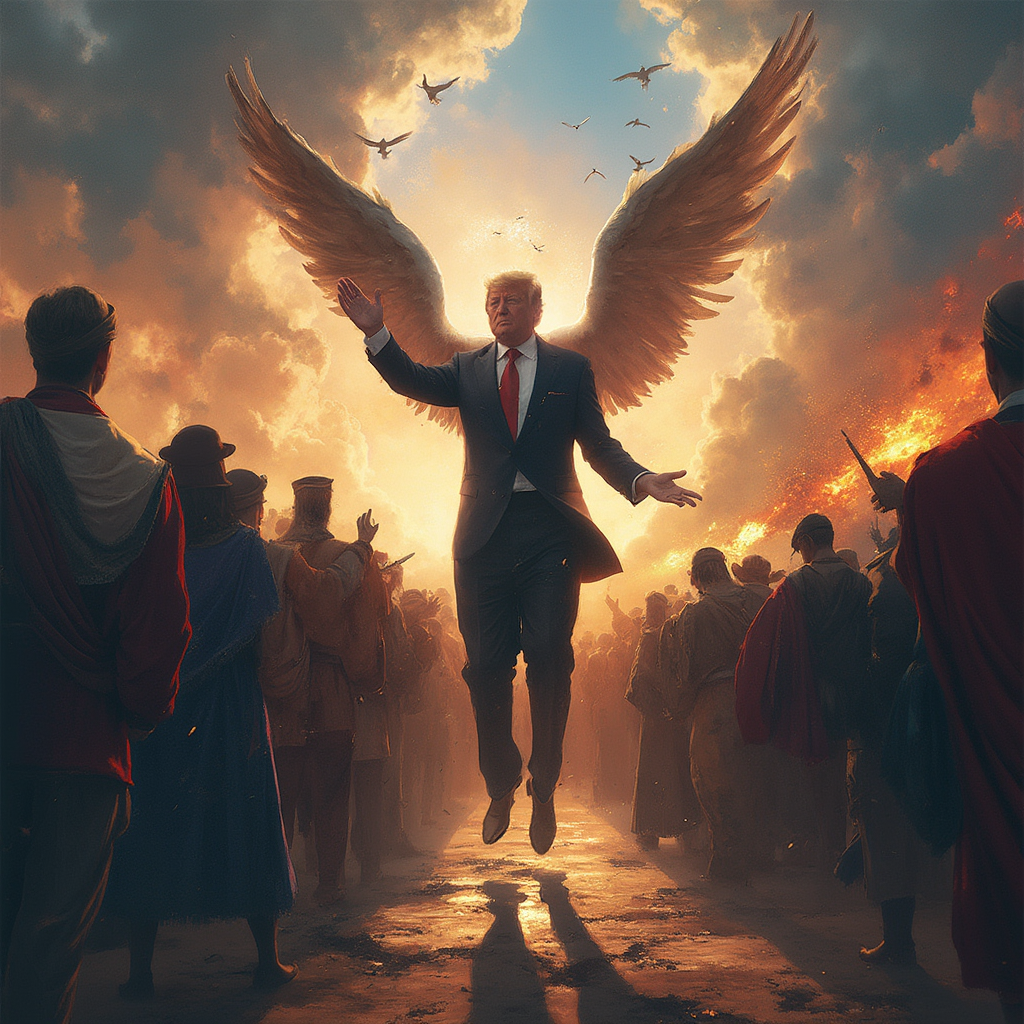The intersection of faith and politics has long been a defining aspect of American evangelicalism, shaping voting patterns and public discourse. The presidency of Donald Trump, in particular, has garnered significant attention and controversy within religious communities. While some evangelicals have supported Trump based on his policy stances or judicial appointments, another, more esoteric reasoning has emerged: the belief that Trump’s presidency could accelerate the fulfillment of biblical end-times prophecy.
This phenomenon is rooted in specific eschatological interpretations, which frame world events through the lens of apocalyptic prophecies in the Bible. For some evangelical Christians, Trump’s controversial and polarizing leadership has been viewed as a tool for hastening the return of Jesus Christ, a hope that has profound spiritual implications. This article explores the motivations behind this belief, how it ties into evangelical eschatology, and the theological complexities that drive some evangelicals to support Trump as a figure associated with the end times.
Understanding Evangelical Eschatology and the End Times
To understand why some evangelical Christians see Trump as a figure who might hasten the end times, it is essential to grasp the basics of evangelical eschatology. The study of end-times prophecy is a significant part of evangelical theology, often drawing from the books of Daniel, Ezekiel, 2 Thessalonians, and Revelation. These scriptures describe a sequence of events that will occur before Jesus returns to establish His kingdom on earth.
Key elements of evangelical end-times beliefs include:
- The Rise of the Antichrist: Many evangelicals believe that the end times will feature the emergence of a charismatic yet deceitful leader known as the Antichrist. This figure will bring about global upheaval, deceive nations, and lead humanity away from God before being ultimately defeated by Jesus Christ.
- The Great Tribulation: A period of immense suffering, conflict, and natural disasters, the Great Tribulation is believed to precede Christ’s return. It is a time when believers will be tested, and the faithful will need to hold steadfastly to their faith.
- The Second Coming of Christ: The culmination of the end times, where Jesus returns to defeat evil, establish His kingdom, and bring everlasting peace and justice.
The Role of Political Events in Eschatological Thought
Evangelical Christians have often interpreted world events as signs of the approaching end times. Wars, natural disasters, and the rise of influential world leaders have all been analyzed through a prophetic lens. Donald Trump’s presidency, with its significant cultural and political impact, has been no exception. His divisive rhetoric, controversial policies, and near-cult-like following have sparked conversations about whether he could be a prophetic figure—potentially even the Antichrist or someone paving the way for the Antichrist’s arrival.
Why Evangelicals Might See Trump as Hastening the End Times
Several factors contribute to the belief among some evangelicals that Trump could hasten the end times:
- Fulfillment of Prophecy Through Global Unrest Trump’s presidency was marked by significant political and social upheaval, both domestically and internationally. From trade wars to escalated tensions in the Middle East, the global unrest during his administration led some evangelicals to see his leadership as a catalyst for end-times events. Prophetic interpretations often view such instability as a precursor to the Great Tribulation, where nations will be in turmoil, and a charismatic leader (potentially the Antichrist) will rise to offer false hope.For those who believe that Trump’s leadership accelerated the pace of these events, his presidency represents a stepping stone to the fulfillment of God’s ultimate plan. In this view, the more chaotic and unpredictable the world becomes, the closer believers are to witnessing Christ’s return.
- The Paradoxical Desire for the Antichrist While the Antichrist is traditionally seen as a malevolent figure who must be resisted, some evangelical Christians accept that his emergence is an essential part of God’s prophetic timeline. As a result, there is a theological paradox where believers, while opposing evil, also anticipate and even desire the events that signal the end times, including the rise of the Antichrist. This paradox has led some evangelicals to view Trump’s presidency, with its authoritarian undertones and cult-like following, as a harbinger of this prophetic figure.While most Christians do not explicitly wish for the Antichrist to come to power, the anticipation of end-times events creates a complicated relationship with political leaders who exhibit traits associated with the Antichrist. Trump’s unpredictability, charismatic appeal, and controversial policies may be seen as fitting this profile, making his presidency a point of fascination and even hope for those eager to see prophecy fulfilled.
- The Acceleration of God’s Plan The belief that God’s timeline can be accelerated is a common theme among evangelicals who are eager for Christ’s return. For these believers, political events are not random but divinely orchestrated. The notion that Trump might hasten the arrival of the end times stems from a deep desire to see God’s ultimate plan realized. If Trump’s presidency is perceived as a step toward fulfilling biblical prophecy, some evangelicals may support him, even if they do not agree with all of his actions or policies.This support is not necessarily an endorsement of Trump himself but rather a recognition that God can use even flawed or corrupt leaders to fulfill His purposes. The idea that God works in mysterious ways is central to this belief, and Trump’s presidency is seen as part of a divine plan that will eventually lead to the Second Coming of Christ.
- A Desire for the Ultimate Triumph of Good Over Evil End-times theology promises the ultimate defeat of evil and the establishment of a perfect, eternal kingdom. Some evangelicals view the current political and social chaos as a necessary prelude to this divine victory. By supporting a figure like Trump, who they believe could be a catalyst for these events, they are expressing hope for the ultimate triumph of good over evil. In this context, the suffering and tribulation associated with the end times are seen as temporary and necessary for the realization of God’s greater plan.
The Influence of the Christian Right and Prophetic Movements

The evangelical support for Trump is also tied to the influence of the Christian Right and the rise of prophetic movements within evangelicalism. Many prominent evangelical leaders have endorsed Trump, framing him as a defender of religious liberty and traditional values. These endorsements often emphasize Trump’s role in appointing conservative judges, protecting religious freedoms, and supporting pro-life policies. However, for some believers, the prophetic significance of his presidency goes beyond policy achievements.
Certain charismatic and prophetic movements within evangelicalism have promoted the idea that Trump is a “chosen” leader, anointed by God to fulfill a specific purpose. While not all evangelicals subscribe to these beliefs, they have gained traction among those who view the political landscape through an apocalyptic lens. The idea that Trump could be part of God’s plan to usher in the end times has been a powerful motivator for some evangelicals, shaping their political engagement and voting behavior.
The Challenges and Criticisms of This Perspective
The belief that Trump’s presidency could hasten the end times is not without its critics, both within and outside the evangelical community. Many theologians and Christian leaders caution against attempting to interpret contemporary events as definitive signs of the end times. They argue that such interpretations can lead to fear, division, and a misplaced focus on politics rather than the gospel’s core message of love, grace, and redemption.
Critics also point out the dangers of conflating religious beliefs with political allegiances. The support for Trump among some evangelicals has led to accusations of idolatry, where political loyalty overshadows spiritual principles. This criticism is particularly relevant when considering the moral and ethical concerns raised by Trump’s behavior and rhetoric. The question arises: Can a leader whose actions often contradict Christian teachings truly be part of God’s divine plan?
Additionally, some argue that focusing too much on end-times prophecy can distract believers from addressing present-day issues, such as social justice, poverty, and environmental stewardship. The emphasis on hastening the end times may lead to apathy or inaction regarding these pressing concerns, as believers prioritize spiritual readiness over earthly responsibilities.
A Broader Implication: The Role of Faith in Politics
The support for Trump among end-times-focused evangelicals highlights a broader trend in American politics: the significant influence of faith on voting behavior. For many evangelical Christians, political decisions are deeply intertwined with their spiritual beliefs, shaping how they view candidates, policies, and the direction of the nation. The desire to hasten the end times adds a unique dimension to this dynamic, demonstrating how apocalyptic theology can influence political engagement.
While not all evangelicals share the belief that Trump’s presidency is tied to biblical prophecy, the idea has become a notable part of the conversation around faith and politics. It raises important questions about the role of religious beliefs in shaping public policy and the extent to which spiritual motivations should influence voting behavior.

Conclusion: A Complex and Controversial Belief
The belief that Donald Trump’s presidency could hasten the end times is a complex and controversial aspect of evangelical Christianity. It reflects a deep longing for the fulfillment of God’s plan and the ultimate triumph of good over evil. However, it also raises theological and ethical questions about the relationship between faith and politics and the dangers of interpreting world events through a prophetic lens.
As evangelicals continue to navigate the political landscape, the conversation around end-times prophecy and political action remains a significant and divisive topic. For some, Trump is a flawed yet necessary figure in God’s grand design. For others, the focus should be on living out the gospel’s teachings rather than trying to accelerate the end of history. Regardless of one’s perspective, the impact of these beliefs on American politics is undeniable, shaping the decisions and actions of millions of voters.





Leave a Reply